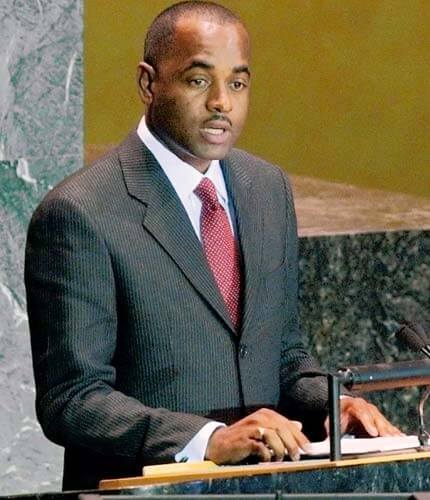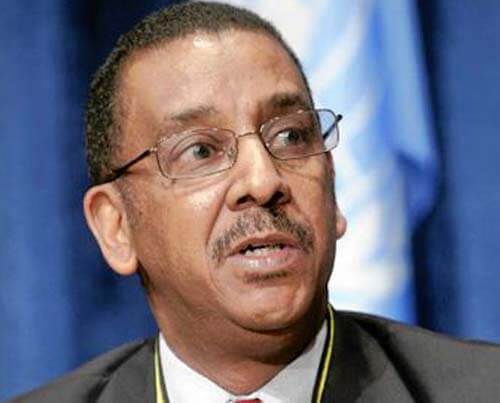The United States claims that Rastafarians, Voudou practitioners and Muslims are discriminated against in Caribbean Community (CARICOM) countries.
In its International Religious Freedom Report for 2012, the Department of State says these are more pronounced in Haiti, Jamaica, Trinidad and Tobago, and the Bahamas.
The report says while there were no reports of abuses of religious freedom in Haiti, some members of the Vodou and Muslim communities “complained they did not enjoy the same legal protections as Christians.”
Vodous, which is widely practiced in Haiti, is often blended with elements of other religions, usually Catholicism, the report says.
It says the leader of a prominent multidenominational group reports half the Haitian population practices some form of Vodou.
The report says Vodou leaders and civil society representatives expressed concern that the May passage of a constitutional amendment could again criminalize the practice of Vodou and lead to increased discrimination against Vodou adherents.
But the report says government officials, including the prime minister, immediately responded to these concerns and stressed that the new amendment would not limit the freedom of religious expression.
It says government officials noted that a 2003 presidential decree recognizing Vodou as a religious practice remained in force.
Washington says, in October and November, government officials met “numerous times” with Vodou leaders and practitioners “to assuage lingering concerns,” adding that “there were no reports of discrimination against the Vodou community arising from the May constitutional amendment.”
The report says that some Muslim religious leaders claimed that the Haitian government was reluctant to recognize Islam, and that Muslims married in a religious ceremony did not receive the same government recognition accorded to Christians who married in the church.
The Muslim leaders complained that religious ceremonies could obtain government recognition only through a civil court.
According to the State Department, the press reports a “growing number” of Muslims in Haiti since the January 12, 2010 earthquake, citing an estimate of 2,000 to 10,000.
It says the authorities generally permitted prisoners and detainees to practice their religions freely and to request access to a Protestant minister, a Catholic priest, a Vodou leader, or a Muslim cleric.
But the report says while society generally was tolerant of the variety of religious practices, citizens’ attitudes toward Vodou “ranged from acceptance as part of the culture to rejection as incompatible with Christianity.”
It says the growing visibility of Islam after the 2010 earthquake expanded local perceptions of religious diversity and “demonstrated the need for more sustained interfaith partnership to address the country’s developmental challenges.”
The report says that Religions for Peace and the Interfaith Council of Christian, Muslim, and Vodou groups conducted a series of interfaith dialogues on cholera awareness and the importance of the Creole language in promoting religious understanding.
In Jamaica, the State Department says there were reports of societal discrimination based on religious affiliation, belief, or practice, stating that Rastafarians alleged the overwhelmingly Christian population discriminated against them, “although there were signs of increasing acceptance.
“Rastafarians said that elements of their religion, such as wearing dreadlocks and smoking marijuana, presented serious barriers to their ability to find employment and achieve professional status in the official economy,” the report says.
It cites a Rastafarian group, the Church of Haile Selassie I, which it says continued to seek religious incorporation “for the 15th year without success.
“Some Parliamentarians maintained Parliament should continue to deny incorporation because church members used marijuana, which was illegal, in religious services,” the report says, adding that “the church asserted this was not the case and indicated it used legal herbs.”
The report also says that Rastafarians continued to allege that law enforcement officials unfairly targeted them.
However, the report says it was not clear whether the reported discrimination was based on religious belief or was due to the group’s alleged illegal use of marijuana as part of religious practice.
With the exception of the concerns raised by Rastafarians, the State Department says there were no other reports of societal abuses or discrimination based on religious affiliation, belief, or practice in Jamaica.
It says the U.S. embassy in Kingston, the Jamaican capital, “engaged with and encouraged dialogue” among religious groups, including Christians, Muslims, Jews, and Rastafarians, “as part of its overall efforts to promote religious freedom.”
During a three-month state of emergency declared by Parliament in 2011, the report notes that authorities in Trinidad and Tobago arrested 16 Muslim men who were allegedly plotting to assassinate the prime minister and three other cabinet ministers.
The report says that the government never charged the men with any crime and released them after one week.
During the year, it says Muslims referred to this incident as “an example of bias against the Muslim community.”
The report says several of those arrested claimed to be pursuing legal action against the Trinidad and Tobago government for wrongful arrest.
It says the U.S. embassy in Port-of-Spain, the Trinidad capital, increased outreach to the Muslim community with a social media training program “encouraging leadership and the free exchange of ideas among Muslim youth.”
In addition, the report says embassy staff met regularly with Muslim religious and civil society leaders.
In the Bahamas, the State Department says Rastafarians alleged that prison officials were responsible for “ongoing discrimination against detainees at Fox Hill Prison.
“Specifically, they reported that prison officials cut the dreadlocks of Rastafarians held in custody for possession of small amounts of marijuana,” it says, stating that, under Bahamian law, “persons convicted for possession of as little as one marijuana cigarette face a maximum sentence of four years in prison.”
The report says that the Bahamian government defended the practice of cutting Rastafarians’ dreadlocks as “standard procedure for hygienic reasons.”
But the report says Rastafarians contended “it was in fact based on discrimination rather than hygiene.”
Washington also says Rastafarians reported that Fox Hill Prison “failed to meet their religious dietary requirements,” stating that, on Nov.19, The House of Rastafari, a Rastafarian group, declared its intention to appeal to the judiciary about these practices.
The report says that, on Dec.r 10, Human Rights Day, several Rastafarians held a peaceful demonstration in the inner city “to highlight acts of police harassment and brutality and the cutting of Rastafarians’ dreadlocks.”
The report also says there were “no arrests related to violations of the law against practicing Obeah (and Voodoo) during the year.”
The State Department says Rastafarians in St. Kitts and Nevis “complained about the government’s prohibition of marijuana use, which they described as integral to their religious rituals.
“Members of the group stated they were being marginalized and were victims of religious intolerance,” it says, noting that, on Aug. 17, the Nyabinghi Theocracy Order, a Rastafarian organization, held a march and rally in Basseterre, the St. Kitts capital.
“The prime minister affirmed that the government would not legalize marijuana,” the report says, adding that Rastafarians continued to complain of discrimination, especially in hiring and in schools.
Rastafarians continued to complain of the same alleged practice in Antigua and Barbuda, and St. Vincent and the Grenadines, the report says.
In Dominica, St. Lucia, as well as St. Vincent and the Grenadines, it says Rastafarians also complained about the prohibition on marijuana use, “which was integral to their religious rituals.”


















